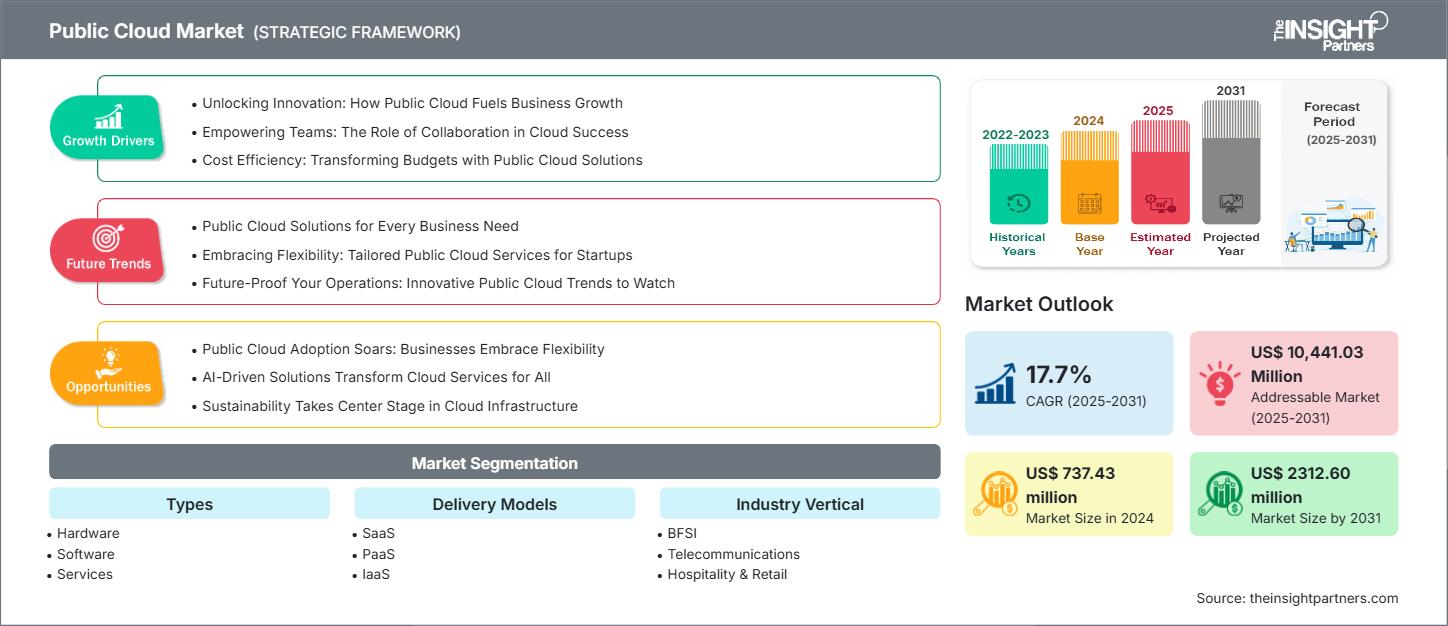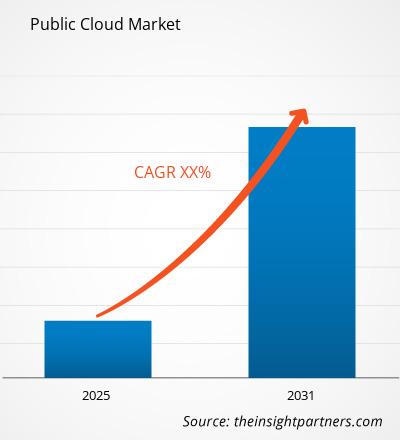预计到 2031 年,公共云市场规模将达到 6844.7 亿美元。预计该市场在 2025 年至 2031 年期间的复合年增长率将达到 14.8%。
云服务充当存储或第三方供应商的角色,用于存储组织的各种用途的数据。存储的数据随后会被检索用于分析。公有云领域指的是通过公共网络提供的云服务,用户可以远程访问这些服务。公有云模式的最大优势在于,组织无需过多担心数据存储和维护问题。这种部署方式是异地部署,架构类型为多租户,多个组织共享第三方供应商的计算空间。中小企业将数据存储和维护外包给第三方云供应商,从而节省大量基础设施建设方面的资本投入,因此能够获得更多收益。成本节约、快速构建和测试以及更短的产品上市时间吸引了各行各业的众多企业采用公有云技术。
根据您的需求定制此报告
您可以免费获得任何报告的定制服务,包括本报告的部分内容、国家/地区层面的分析、Excel 数据包,以及面向初创企业和高校的优惠折扣。
公有云市场:战略洞察

-
获取本报告的主要市场趋势。这份免费样品将包含数据分析,内容涵盖市场趋势、估算和预测等。
过去十年,软件行业经历了翻天覆地的变化。其中最引人注目的是企业对云模式的部署,这主要归功于云模式的诸多优势。企业高度可扩展的特性促使他们选择云服务,因为存储中心的数据可以根据用户需求进行灵活扩展。此外,公共云供应商通常采用按需付费的定价模式。企业,尤其是中小企业,无需一次性支付巨额费用,因此部署公共云模式对它们来说极具吸引力。企业的核心竞争力得以保持,从而能够在瞬息万变的市场中保持竞争力。运营成本的降低以及来自单一来源的大量针对特定业务的解决方案是推动公共云服务市场发展的主要因素。对可扩展、灵活、易用且高效的IT基础设施的需求也是推动该市场发展的重要因素。由于所有操作都由机器自动完成,人为错误得以最小化,最终吸引企业采用公共云服务。上述驱动因素是该市场呈指数级增长的原因。尽管公共云服务在发达国家已被广泛采用,但其发展仍面临一些制约因素。数据隐私安全问题是该市场的主要制约因素。这种云模式对互联网连接的要求很高,在网络连接较差的国家,这将影响公共云的部署。此外,该模式与传统系统的集成也是一个制约因素。其他制约因素还包括服务中断和数据迁移问题。
公有云市场区域洞察
The Insight Partners 的分析师对预测期内影响公共云市场的区域趋势和因素进行了详尽的阐述。本节还探讨了北美、欧洲、亚太、中东和非洲以及南美和中美洲等地区的公共云市场细分和地域分布。
公共云市场报告范围
| 报告属性 | 细节 |
|---|---|
| 2024年市场规模 | XX亿美元 |
| 到2031年市场规模 | 6844.7亿美元 |
| 全球复合年增长率(2025-2031年) | 14.8% |
| 史料 | 2021-2023 |
| 预测期 | 2025-2031 |
| 涵盖部分 |
按类型
|
| 覆盖地区和国家 |
北美
|
| 市场领导者和主要公司简介 |
|
公有云市场参与者密度:了解其对业务动态的影响
公共云市场正快速增长,这主要得益于终端用户需求的不断增长,而终端用户需求的增长又源于消费者偏好的转变、技术的进步以及对产品优势认知的提高。随着需求的增长,企业不断拓展产品和服务,持续创新以满足消费者需求,并把握新兴趋势,这些都进一步推动了市场增长。

- 获取公有云市场主要参与者概览
全球公有云市场按类型分为硬件、软件和服务。此外,根据交付模式,公有云市场又细分为软件即服务 (SaaS)、平台即服务 (PaaS) 和基础设施即服务 (IaaS)。同时,该市场还根据最终用户进一步细分,即中小企业和大型企业。公有云市场也按行业垂直领域进行细分,包括银行、金融服务和保险 (BFSI)、电信、酒店和零售、政府、制造业和医疗保健。北美凭借其显著的技术进步和社会经济发展,在全球公有云市场中占据领先地位。欧洲作为另一个重要的工业中心,也为公有云市场的增长做出了贡献。欧洲的北欧地区拥有众多小型企业,对欧洲公有云市场份额的贡献尤为显著。此外,亚太地区正在稳步追赶这些地区,印度和中国等发展中国家正逐步加大对公有云技术的投资。全球公共云市场的主要参与者包括微软公司、Salesforce.com、思科系统公司、VMware、谷歌公司、甲骨文公司和Eucalyptus等。
- 历史分析(2 年)、基准年、预测(7 年)及复合年增长率
- PEST和SWOT分析
- 市场规模、价值/数量 - 全球、区域、国家
- 行业和竞争格局
- Excel 数据集
近期报告
客户评价
购买理由
- 明智的决策
- 了解市场动态
- 竞争分析
- 客户洞察
- 市场预测
- 风险规避
- 战略规划
- 投资论证
- 识别新兴市场
- 优化营销策略
- 提升运营效率
- 顺应监管趋势






















 获取免费样品 - 公有云市场
获取免费样品 - 公有云市场